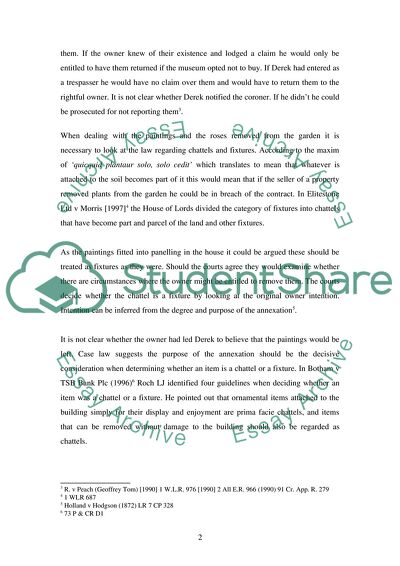
- Home
- Free Samples
- Premium Essays
- Editing Services
- Extra Tools
- Essay Writing Help
- About Us
- Studentshare
- Subjects
- Miscellaneous
- Case of property law
Case of property law - Essay Example

- Subject: Miscellaneous
- Type: Essay
- Level: Undergraduate
- Pages: 4 (1000 words)
- Downloads: 0
- Author: kpollich
Extract of sample "Case of property law"
The obligation to report finds applies to everyone, including archaeologists. 2. Coins: all coins from the same find provided they are at least 300 years old when found (but if the coins contain less than 10 per cent of gold or silver there must be at least 10: there is a list of these coins in the Code of Practice). As some of these coins date back to 1700 Derek has a duty to report these as. Failure to report without a reasonable excuse could lead to imprisonment for up to three months or a fine.
With items held to be treasure the coroner will inform the British Museum or the National Museums & Galleries of Wales who decide if they wish to acquire these. The reward would go to the finder providing he had permission to be on the land. Should they decide not to purchase they will return them to the finder unless the landowner has lodged an objection. If the landowner objects the items would be ordered to be returned to him2. As the landowner did not know of the find it is unlikely he would lodge a claim.
Derek could sell the coins to a museum or any other party if the museum did not want them. If the owner knew of their existence and lodged a claim he would only be entitled to have them returned if the museum opted not to buy. If Derek had entered as a trespasser he would have no claim over them and would have to return them to the rightful owner. It is not clear whether Derek notified the coroner. If he didn’t he could be prosecuted for not reporting them3. When dealing with the paintings and the roses removed from the garden it is necessary to look at the law regarding chattels and fixtures.
According to the maxim of ‘quicquid plantaur solo, solo cedit’ which translates to mean that whatever is attached to the soil becomes part of it this would mean that if the seller of a property removed plants from the garden he could be
...Download file to see next pages Read MoreCHECK THESE SAMPLES OF Case of property law
Property Law Case
Property Law Master Case Study
Property Law Degree Case Study
Property Law College Case Study
Analysis of Property Law Case
Property Law Cases
Analysis of Property Law Cases
Discussing the Case Concerning Property Law in England

- TERMS & CONDITIONS
- PRIVACY POLICY
- COOKIES POLICY